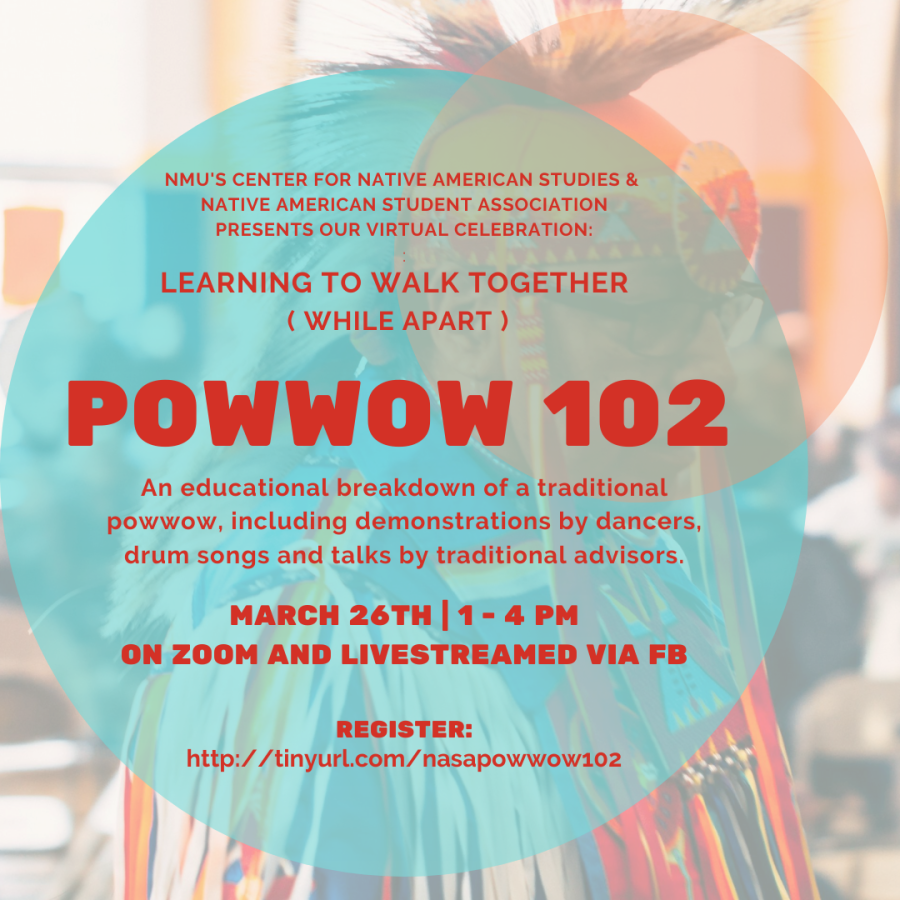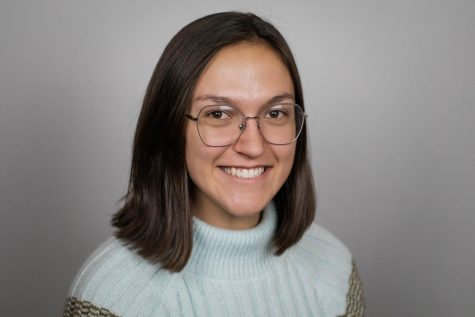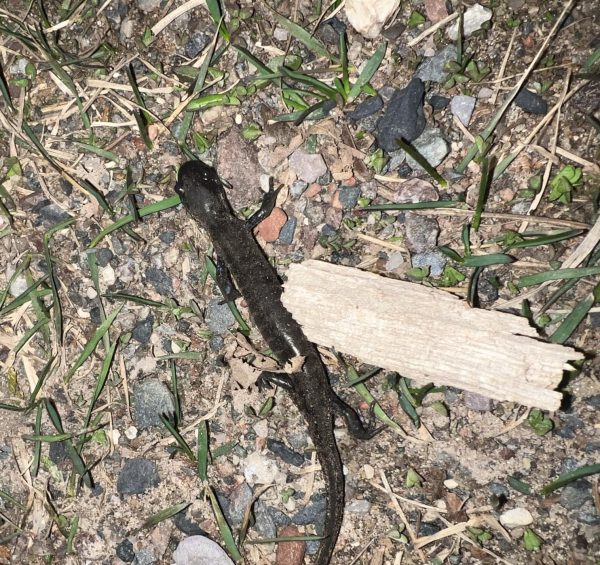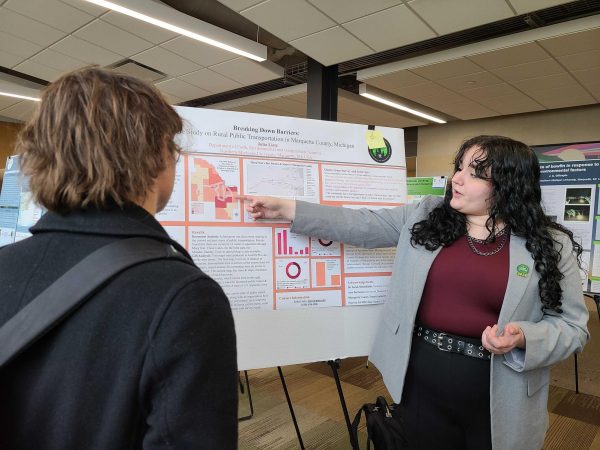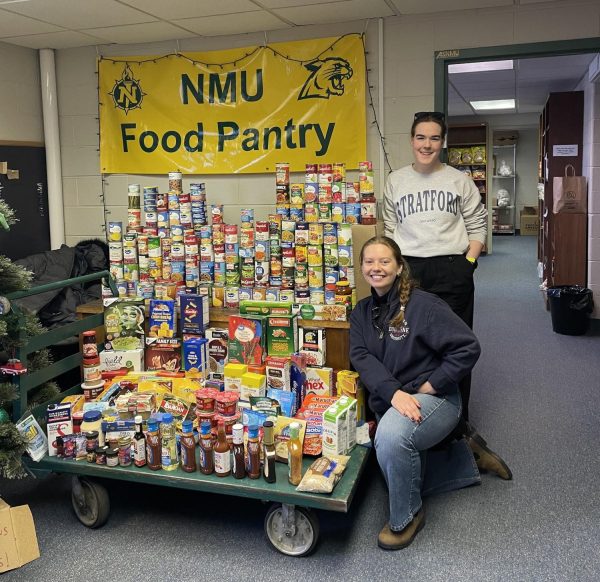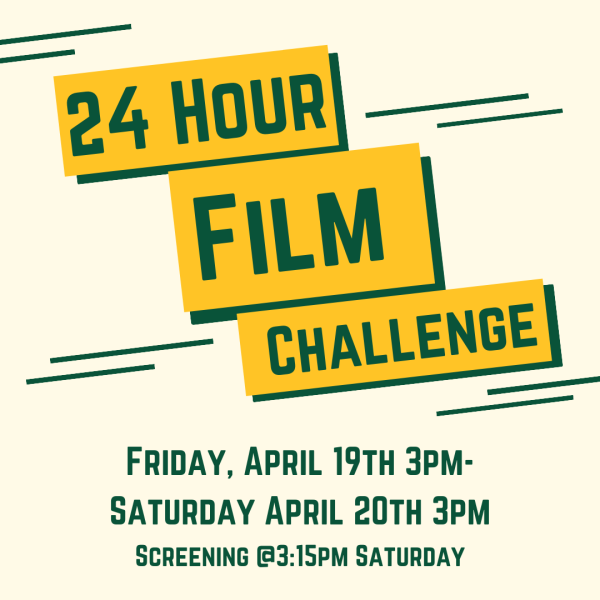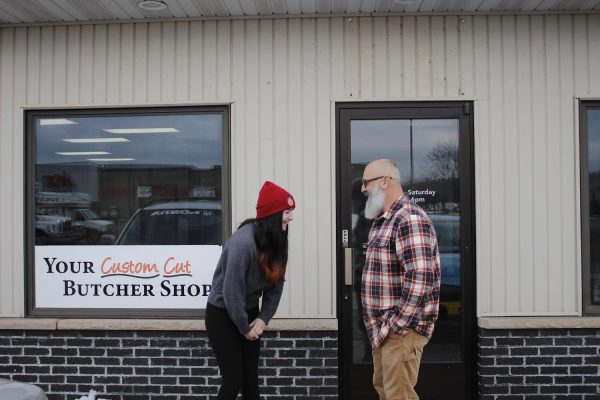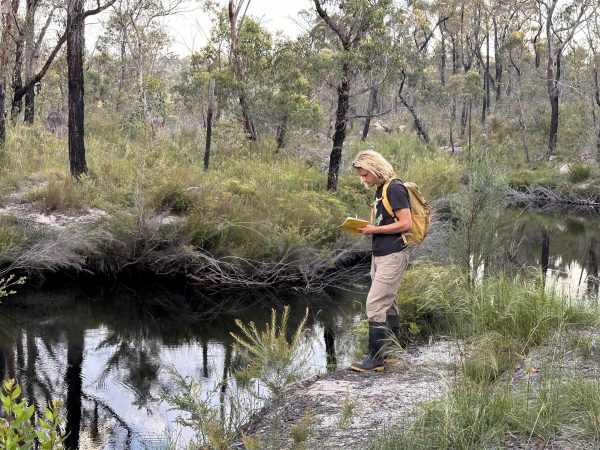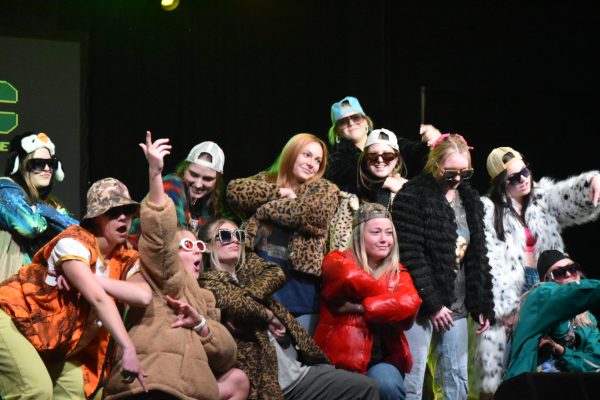Celebration of culture through song, dance, drums: Powwow 102
Center of Native American Studies and Native American Student Association set to host virtual powwow
Photo courtesy of the Native American Student Association and Center for Native American Studies
CELEBRATION – CNAS and NASA invite the campus community to learn about and participate in a virtual educational Native American powwow. The event will be livestreamed over FaceBook and can be viewed via Zoom.
March 24, 2022
Despite being enrolled with the Sault Ste. Marie Tribe of Chippewa Indians since birth, Shelby Boggs, first-year NMU student and member of the Powwow 102 promotional committee, did not fully comprehend what it culturally meant to belong to a tribe when she was younger. However, at an elementary age Boggs experienced her first powwow and the spiritual connection between her, the celebrational event and her heritage suddenly clicked.
“That was my first exposure to the culture and I just cried,” Boggs said. “I did not know what any of it meant, but I felt it in my soul.”
To honor this important cultural celebration while still following COVID protocols, the Center of Native American Studies and the Native American Student Association have been in collaboration since early February in preparation for their second virtual educational powwow, Powwow 102: Learning to Walk Together (While Apart).
Both NMU students and the broader Marquette community are welcome to participate in the festivities on March 26, from 1-4 p.m. via Zoom or live-streaming on NASA’s Facebook page.
Powwow 102 is set to highlight and explain the different aspects of a traditional Native American powwow, utilizing guest speakers and traditional advisors from various local tribes in the Michigan and Wisconsin area. These speakers are set to address several topics, varying from the importance of beadwork to an explanation of proper etiquette when attending a powwow.
Along with these educational speeches, Powwow 102 is going to host a number of demonstrations, specifically that of drum and dance which constitute the center of a traditional powwow celebration.
“The powwow is a traditional Native American celebration of song and dance especially,” Bazile Panek, president of NASA and a lead facilitator on the Powwow 102 planning committee, said. “There’s a lot of different dance styles that are present and different drummers who are sharing songs either from their specific communities or songs that they have learned.”
At the heart of all powwow celebrations is the dewe’igan, which means drum in Ojibwe. Transcending beyond that of just an instrument, the drums used throughout a powwow are understood to be living beings and spirits, specifically that of tribal grandfathers.
“We teach that the drum symbolizes the heartbeat of our people,” Boggs said. “So, those dances you see to the beat of the drum are symbolic of our prayers. It is us praying to gichi-manidoo, the great spirit, our creator.”
Beyond education and presentations, the Powwow 102 planning committee allotted time for a thirty-minute “feast break” from 2-2:30 p.m. This time is meant to give audience members a chance to eat and facilitate discussion with local vendors who will be in attendance. At traditional in-person powwows, vendor tables display a variety of handcrafted goods for sale, like art, beadwork and Indigenous foods.
“This feast break will let people talk to vendors and see what they are offering,” Panek said. “[The vendors] will be joining us on Zoom and they will share a description of their business, how to buy from them and their contact information.”
The Learning to Walk Together Powwow has been an annual celebration at NMU for the past 26 years, originating with Native American students who wanted to organize a powwow within the campus community. The planning of Powwow 102 has been a joint effort between several campus organizations and individuals. Those specifically involved have been members of NASA, the Center of Native American Studies and students enrolled in Native American Community Engagement, a capstone practicum course.
Due to COVID-19, those involved in the planning process have had to adjust the traditional in-person aspects of the Learning to Walk Together Powwow to fit an online format. The annual powwow has been held virtually the past two years out of an abundance of caution for all community members, specifically that of the Native American community.
“It was a very intentional choice to have the powwow virtual,” said Boggs. “COVID-19 disproportionately affects Native American communities, who have the highest mortality rate from COVID in comparison to other groups. We very much wanted this to be a virtual event to protect not only our students and faculty but also our community leaders, especially our elders.”
In light of the struggles that have accompanied the COVID-19 pandemic, Powwow 102 has chosen to feature a demonstration of the jingle dress dance. For Brandi Howard, a head staff member of Powwow 102 through NASA, the inclusion of the jingle dresses is an important aspect of this year’s powwow celebration.
“Healing has been a big focus for us with everything that has been going on,” Howard said. “So things like the jingle dress dance, which is a traditional dance known for its role of healing, has been very important and is going to be one of our topics at Powwow 102.”
Despite the lack of an in-person experience, Powwow 102 is still encouraging audience participation and discussion throughout the celebration. Near the end of the powwow, a period of time has been dedicated to audience discussion for those on Zoom. Additionally, Zoom participants will be automatically entered into a raffle with a chance to win gift cards to local businesses.
“It’s important to attend Powwow 102 because regardless of where you are, you are on Native land,” Boggs said. “It’s about giving people genuine exposure to the culture. That exposure can lead to acceptance, and that acceptance can lead to unity and healing between communities.”
While Powwow 102 is targeted towards campus students, anyone is welcome to attend free of charge. People looking to register for the event, or are seeking more information, can visit the Hub.
“I’d highly suggest that the campus and Marquette community especially attend because it will show that Native American culture specific to this area is alive and well,” Panek said. “It will also give [attendees] an opportunity to understand that there are people around them participating in these cultural practices every day.”





















